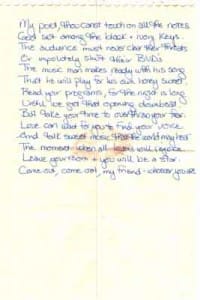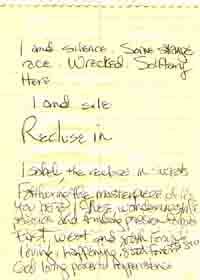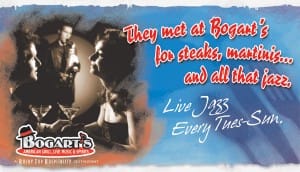Commute today: the wife drives me (in the new Prius) to the airport, and it’s ten minutes in the red-carpet lounge for a mini-bagel and coffee — seat 1C to LAX, a shuttle to the Tom Bradley International Terminal, through customs, into the ANA first-class suite for more coffee, then eleven sunshine-filled hours to Tokyo, then a bus takes us to the main terminal, through immigration, a limousine bus (it’s just a regular bus, only more expensive) to Akasaka, up the hill to Villa Fontaine Roppongi.
You can hear a piano fall, you can hear me coming down the hall
To find the truth, I’ve even lied
Kaiser Hospital, South City. The technician behind the desk squints at my paperwork. “What is this?” she said, turning the form on its side. “Bleeding time? I’m not sure we know how to do a bleeding time test here.”
And when the technician said ‘bleeding time’ my heart jumped a little bit into my throat. Now I love the good horror movie from time to time, and I’ve even played and enjoyed Dracula myself. But there’s something about the phrase ‘bleeding time’ that makes my heart quicken. Once blood ceases being corn syrup and food coloring and turns into the real iron-based platelet stuff, I begin to freak out. I donated blood once when I was in high school, before I was diagnosed with multiple sclerosis. I gave a pint of blood and the phlebotomist held the bag to my face and said, “Good job… it’s warm, just like you.” I don’t remember anything after that.
“Oh, you need a bleeding time test,” said the technician. “Let’s get all these other blood tests out of the way first, and then we’ll do a bleeding time test after that.”
“Now wait a minute, are you saying that –”
“Back this way please.” I followed the technician past rows and rows of people being stuck by phlebotomists. The other patients were cool, mellow, indifferent even. I saw rows and rows of big fat needles sticking into people’s arms. I started to pant a little but kept my cool.
The technician opened another door. “Sit down,” she said. This was a private room with one tilted chair, like a dentist’s chair. To the right of the chair was a steel-framed H. She closed the door behind me and I swear that I could have heard a pneumatic hiss as the door slammed shut.
I listened to the voices on the other side of the door. “John Byrd, yes… He needs a bleeding time test… need the blood work before the bleeding time test…” I could have pounded on the door, but I’m sure it would have been no use.
After about five days the door opened and in came this fiftyish Asian woman. Her name tag read ‘Manager — Phlebotomist II.’ “John? Are you here for the special test?”
“Actually, I was kind of hoping for the ordinary test,” I said.
“We’re going to draw some of your blood and then we will do the bleeding time test,” she said.
“I am drastically aware of this fact,” I said.
She pushed a little shelf underneath my elbows. I said, “Other phlebotomists have done this to me before. They always collapse my veins.”
“Mmmm,” said Manager Phlebotomist II, nodding. She pulled out a butterfly needle and half a dozen vials. “Now I want you to make a fist,” she said as she tied a bit of rubber around my upper arm and swabbed it with alcohol. “Here, your vein is right here. Mmm, let me see your right arm. Yes, your vein is better here in your left arm. For the bleeding time test. Now don’t move. AAAARGH!” And she raised the needle over her head and stabbed it into my left eye, and I staggered around the room for a while screaming. Actually, that didn’t happen. She stabbed the needle into my left arm, and wiggled just a teensy bit, and then puuushed…
I grabbed hold of the table and thought of Mozart’s Sonata #11 in A.
Manager Phlebotomist II sighed, sounding annoyed. “This isn’t working,” she said. “Your vein is collapsing too much.”
I picked up the clipboard and brained her with it, I yanked out the needle, and ran for the door. Actually, that didn’t happen. Instead, I said, “Now what?”
Manager Phlebotomist II pulled out the needle and taped a bit of cotton on my arm. “Give me your other arm,” she said. “Are you OK?”
“Um, sure,” I said. Actually, that didn’t happen. Instead, I said, “I really hate needles. I really hate this.”
Manager Phlebotomist II said, “Oh, don’t worry, I’ll be very gentle this time.” She pulled out another needle and began prepping my right arm.
“What’s the, um, bleeding test?” I asked.
Manager Phlebotomist II said, “We make two incisions and time the amount of time that it takes for the blood to coagulate.”
I gulped. “Does it hurt?”
Manager Phlebotomist II said, “Oh, it won’t hurt so much. Not as much as some things anyway. It’s just a little…” And she stuck her tongue out at me, making a little moue of distaste.
I blinked.
She stuck the butterfly needle into my right arm and pulled six vials of blood, each one giving a little dart of pain when she pushed it into the needle. She taped up my right arm with a cotton ball.
“Now the bleeding time test,” said Manager Phlebotomist II. She leapt across the shelf and sank her incisors into my throat and, though I beat her with my fists, she hung on until my consciousness slowly drained out of me. Actually, that didn’t happen. Instead, she said, “We make two incisions and clock the amount of time it takes for your blood to coagulate. Left arm again, please.” She opened a drawer and lifted out a little plastic bag labeled Surgicutt.
I want to die. I want to be killed instantly by a meteor. Anything but this. Anything but the Surgicutt.
Manager Phlebotomist II swabbed me again and placed the Surgicutt on my arm and clicked a button, and the blades cut two 1mm deep by 5 mm long scratches in my arm — two teeny little paper cuts.
“Actually, that didn’t hurt so much,” I said.
“Actually, you are a huge pussy,” said Manager Phlebotomist II. Actually, that didn’t happen.
And since we’ve no place to go
We’re riding in a wonderland of snow
At Huntington and Malibu they’re shooting the pier
I tell it “get off the highway”, so my global positioning system guides me away from the deadly clusterfuck of the 405 and toward the southern mountains. I drive through Malibu on the way to LAX for the first time, two hours ago. I bolt south on the two-lane Pacific Coast Highway at the maximum possible speed, BMWs and Volvos flanking me like bees or Gestapo agents. Tony two-story houses perch precariously on the crumbling Malibu cliffs. Touristy restaurants straight out of 1953 beckon and shine. Movie studios — or, at least, pricey marble-covered front offices with names that end in “studios” — meditate upon the black Pacific waters.
In my West Virginia redneck mind, Malibu is a theoretical container for diamonds and movie stars and Barbie. Malibu does not really exist as a town or an entity. But I get it now! Malibu is to Los Angeles as Half Moon Bay is to San Francisco.
In one large motion, I return the rented SUV and bolt to the ticket counter at LAX, hoping that my shortcut will allow me to make my flight home. No dice ? I miss the flight by two minutes. Now I’m surrounded by businessmen who all look exactly like me, all peering into their laptop crystal balls, all waiting to be somewhere else.
As all the heavens were a bell, and being but an ear
This is one of the poems that Isabel Fox wrote on stage in the current production of Romance in D. Isabel Fox was originally dreamed up by James Sherman, but Alex A. portrayed Isabel by writing these words while on stage. So where did these words come from?
Update: Jeanie Forte, Palo Alto Weekly: “Break away from the usual ‘Nutcracker’ to enjoy this heartwarming play… Byrd’s mastery of subtle looks and comic timing add depth to the character.” Keith Kreitman, Oakland Tribune: “This ain’t a Shakespeare comedy but it’s a lot of 21st-century fun… As Charles, Byrd is an actor of much talent, who can range from the dark nature of Dracula to comic fluff like this with remarkable detail. His delayed-reaction timing here is worthy of movieland’s Jack Lemmon.” My mother: “I thought it was very good.”
The world was ready for a new kind of music
And I can’t fight this feeling anymore
As you know, I attended Harvard for many, many years. During my studies at Harvard, I took many, many excellent classes in drama. I will now save you the time and expense of attending a prestigious Ivy League university, which in this case, is Harvard. I have successfully summarized all the knowledge that can be gleaned from those time consuming, expensive drama courses at Harvard, in my newly-minted Theory of Drama, which I refer to as the Fighting-Fucking Theory of Drama.
The central axiom of my Fighting-Fucking Theory of Drama is reflexive simplicity itself:
1. There is fighting or fucking in drama.
There you have it. Once the title of my Fighting-Fucking Theory of Drama is understood, no further study is required. The name of the theory is the central axiom of the theory. This is a great convenience for those people who have difficulty remembering such things. It also helps me differentiate this theory from numerous other theories that I have created.
Very well: in any interesting scene, there is, at a minimum, either fighting or fucking. Here is the contrapositive restatement of the axiom:
1a. If there is no fighting and no fucking, there is no drama.
This is simply the first axiom standing on its head, in order to attract attention, so to speak. If we know that “if A then B” is true, and we know that B is not true, then we may assume that A is not true.
So many eager young writers, armed with an illegal copy of Final Draft and drunk with the panorama of creative possibilities, ignore axiom 1a. They proceed to crank out voluminous quantities of self-indulgent unlikely dialogue. If you, as a writer or an actor, keep axiom 1a firmly ensconced in your mind during your development phase, you will be far ahead of the pack.
If you don’t understand the “if A then B” Boolean math, simply continue reading as though you do. The math is correct. I went to Harvard.
Now we will move on to axiom 2, which is much like axiom 1, only different:
2. Fighting and fucking together is more dramatic than either fighting or fucking alone.
If you can construct a scene where there is both a sexual dynamic plus a set of conflicting goals, you get a dramatic double multiplier whammy: the sex interest times the drive of the conflicting characters. This axiom provides a straightforward fix for any scene that isn’t sufficiently interesting. If a love scene is boring — add conflict. If a conflict scene is boring — add love.
A total absence of either fighting or fucking can be sufficient to destroy a scene. If you have fucking without fighting, you have pornography. If you have fighting without fucking, you have C-SPAN.
At this point, I am ready to accept your questions… Yes?
So, um, this theory of yours… Isn’t it about sex and violence?
No, no. I am speaking metaphorically. Metaphorical fighting, metaphorical fucking. Sex and violence need not — and in most cases, ought not — be overt in order to have dramatic impact. But the fighting or fucking must be expressed or implied in a scene, else no one will care about the scene.
Isn’t that an extremely loosey-goosey definition of fighting or fucking?
I am an artist and a writer. I went to Harvard. I am permitted metaphorical flexibility.
Um, you’re a metaphorical asshole, John…
Pardon?
Nothing. Look, your idea is too sex-obsessed. There’s a whole bunch of drama that has nothing to do with sex.
Such as?
Oh, buttoned-down parlor dramas. Jane Austen. Pride and Prejudice.
Bwah hah hah! That’s about practically nothing but fucking. Mrs. Bennet wants her daughter Jane to fuck Bingley, but Darcy convinces Bingley not to fuck Jane. At the same time, Wickham is trying to fuck Jane’s sister Elizabeth, and Elizabeth is thinking about fucking Wickham. But Darcy tells Elizabeth that he wants to fuck her, but she refuses to. Then Mr. Collins tries to fuck Elizabeth and he also fails, so instead he fucks Elizabeth’s best friend Charlotte. Elizabeth finds out that another sister, Lydia, has run off with Wickham and is secretly fucking him somewhere in London. Bingley returns and fucks Jane. Lady Catherine de Bourgh shows up and asks Elizabeth whether she is fucking Darcy — Elizabeth says no. Hearing this news, Darcy returns to Elizabeth, and they —
All right, all right, I get the idea! Of course classic romances contained veiled sex references —
Modern ones too. I’m in Romance in D, opening this weekend. Follows the Fighting-Fucking Theory of Drama to the letter. And it’s turned out to be a really entertaining comedy. Playing at the Bus Barn in Los Altos from November 17 through December 17, if you love romance, laughter, and happiness, ROMANCE IN D is a must-see!
That was the least subtle segue I’ve ever seen. So you’re basically advocating more sex in the media?
No, that’s the last thing we need. Sex without conflict occurs all the time in modern entertainment — billboards, music videos, Las Vegas, stadium rock. But these entertainment forms can never, ever become permanent or significant. They are designed to be ignored. They are designed to be background noise. The audience can punch in or out at any time. There are no protagonists, no objectives, and no obstacles to be overcome. Sex without conflict is the cultural equivalent of wallpaper. It is designed to be forgotten and replaced by this time next week. Sex multiplied by conflict, however, is endlessly entertaining.
But what about classic dramas in general? Political dramas and the like? There’s no sex in Julius Caesar.
Overtly, there is no sex in Julius Caesar, but imagine the modern twist that a sexual subtext might provide to those thick slabs of iambic pentameter…
CASSIUS
Come, Antony, and young Octavius, come,
Revenge yourselves alone on Cassius,
For Cassius is aweary of the world;
Hated by one he loves; braved by his brother;
Cheque'd like a bondman; all his faults observed,
Set in a note-book, learn'd, and conn'd by rote,
To cast into my teeth. O, I could weep
My spirit from mine eyes! There is my dagger,
And here my naked breast; within, a heart
Dearer than Plutus' mine, richer than gold:
If that thou be'st a Roman, take it forth;
I, that denied thee gold, will give my heart:
Strike, as thou didst at Caesar; for, I know,
When thou didst hate him worst, thou lovedst him better
Than ever thou lovedst Cassius.
BRUTUS
Sheathe your dagger:
Be angry when you will, it shall have scope;
Do what you will, dishonour shall be humour.
O Cassius, you are yoked with a lamb
That carries anger as the flint bears fire;
Who, much enforced, shows a hasty spark,
And straight is cold again.
If the sexual subtext is ignored, Cassius becomes a whiny kid tossing a tantrum in front of Brutus. But if Cassius loves Brutus, and feels spurned by him, the scene takes on a frightening, damaged immediacy, giving Cassius a much more interesting motivation to manipulate Brutus to his will.Okay, you’re really bullshitting now. There’s no sex implied in the relationship between any of the conspirators in Julius Caesar…
Why can’t there be? This is Rome after all. Traditional interpretations of this play frame Cassius and Marc Antony as purely two-dimensional baddies. Why not make the more interesting choice?
As far as I can tell, your idea about sex and conflict —
The Fighting-Fucking Theory of Drama, please.
Um, yeah, that — all you really seem to be saying is that there ought to be sex or conflict in a scene? That seems, um, rather obvious? Aren’t you just repeating what all creative writing books say about scene construction?
[unintelligible]
Hello? Harvard boy?
So, those Raiders, man… they really started to suck when they lost Gruden, eh?
Maxwell Edison, majoring in medicine
Klahr Thorsen writes:
Please check out EDISON AND THE ELECTRIC CHAIR on The History Channel this Saturday (that’s today) at 1:00 PM. It’s probably on some other times as well per your local listings. One warning – I haven’t actually seen this thing, so for all I know my scenes are on a cutting room floor somewhere. Normally I would try to pre-screen for y’all, but we did the shoot about a year ago, and I don’t remember it very well… BUT, I do remember wearing bloomers! And getting killed with an ax! And making out with some guy I met five minutes before the cameras started rolling! And, if that’s not entertainment – I don’t know what is!



